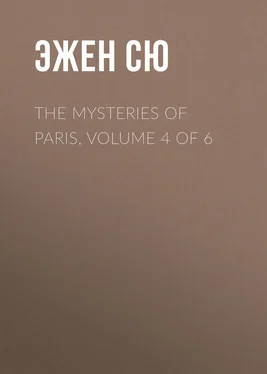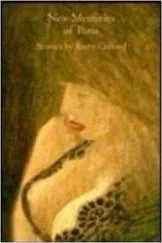Эжен Сю - The Mysteries of Paris, Volume 4 of 6
Здесь есть возможность читать онлайн «Эжен Сю - The Mysteries of Paris, Volume 4 of 6» — ознакомительный отрывок электронной книги совершенно бесплатно, а после прочтения отрывка купить полную версию. В некоторых случаях можно слушать аудио, скачать через торрент в формате fb2 и присутствует краткое содержание. Жанр: literature_19, foreign_antique, foreign_prose, на английском языке. Описание произведения, (предисловие) а так же отзывы посетителей доступны на портале библиотеки ЛибКат.
- Название:The Mysteries of Paris, Volume 4 of 6
- Автор:
- Жанр:
- Год:неизвестен
- ISBN:нет данных
- Рейтинг книги:5 / 5. Голосов: 1
-
Избранное:Добавить в избранное
- Отзывы:
-
Ваша оценка:
- 100
- 1
- 2
- 3
- 4
- 5
The Mysteries of Paris, Volume 4 of 6: краткое содержание, описание и аннотация
Предлагаем к чтению аннотацию, описание, краткое содержание или предисловие (зависит от того, что написал сам автор книги «The Mysteries of Paris, Volume 4 of 6»). Если вы не нашли необходимую информацию о книге — напишите в комментариях, мы постараемся отыскать её.
The Mysteries of Paris, Volume 4 of 6 — читать онлайн ознакомительный отрывок
Ниже представлен текст книги, разбитый по страницам. Система сохранения места последней прочитанной страницы, позволяет с удобством читать онлайн бесплатно книгу «The Mysteries of Paris, Volume 4 of 6», без необходимости каждый раз заново искать на чём Вы остановились. Поставьте закладку, и сможете в любой момент перейти на страницу, на которой закончили чтение.
Интервал:
Закладка:
"Courage, courage! Your spirits will return when your friend is acquitted."
"Oh, yes, he must be acquitted. The judges have only to read his letter to me, and that would be enough, – would it not, M. Rodolph?"
"Really, this letter has all the appearance of truth. You must let me have a copy of it, for it will be necessary for Germain's defence."
"Certainly, M. Rodolph. If I did not write such a scrawl, in spite of the lessons which good Germain gave me, I would offer to copy it myself; but my writing is so large, so crooked, and has so many, many faults."
"I will only ask you to trust the letter with me until to-morrow morning."
"There it is; but you will take great care of it, I hope. I have burnt all the notes which M. Cabrion and M. Girandeau wrote me in the beginning of our acquaintance, with flaming hearts and doves at the top of the paper, when they thought I was to be caught by their tricks and cajoleries; but this poor letter of Germain's I will keep carefully, as well as the others, if he writes me any more; for they, you know, M. Rodolph, will show in my favour that he has asked these small services, – won't they, M. Rodolph?"
"Most assuredly; and they will prove that you are the best little friend any one can desire. But, now I think of it, instead of going alone to Germain's room, shall I accompany you?"
"With pleasure, neighbour. The night is coming on, and, in the evening, I do not like to be alone in the streets; besides that, I have my work to carry nearly as far as the Palais Royal. But perhaps it will fatigue and annoy you to go so far?"
"Not at all. We will have a coach."
"Really! Oh, how pleased I should be to go in a coach if I had not so much to make me melancholy! And I really must be melancholy, for this is the first day since I have been here that I have not sung during the day. My birds are really quite astonished. Poor little dears! They cannot make it out. Two or three times Papa Crétu has piped a little to try me; I endeavoured to answer him, but, after a minute or two, I began to cry. Ramonette then began; but I could not answer one any better than the other."
"What singular names you have given your birds: Papa Crétu and Ramonette!"
"Why, M. Rodolph, my birds are the joy of my solitude, – my best friends; and I have given them the names of the worthy couple who were the joy of my childhood, and were also my best friends, not forgetting that, to complete the resemblance, Papa Crétu and Ramonette were gay, and sang like birds."
"Ah, now, yes, I remember, your adopted parents were called so."
"Yes, neighbour, they are ridiculous names for birds, I know; but that concerns no one but myself. And besides, it was in this very point that Germain showed his good heart."
"In what way?"
"Why, M. Girandeau and M. Cabrion – especially M. Cabrion – were always making their jokes on the names of my birds. To call a canary Papa Crétu! There never was such nonsense as M. Cabrion made of it, and his jests were endless. If it was a cock bird, he said, 'Why, that would be well enough to call him Crétu. As to Ramonette, that's well enough for a hen canary, for it resembles Ramona.' In fact, he quite wore my patience out, and for two Sundays I would not go out with him in order to teach him a lesson; and I told him very seriously, that if he began his tricks, which annoyed me so much, we should never go out together again."
"What a bold resolve!"
"Yes, it was really a sacrifice on my part, M. Rodolph, for I was always looking forward with delight to my Sundays, and I was very much tried by being kept in all alone in such beautiful weather. But that's nothing. I preferred sacrificing my Sundays to hearing M. Cabrion continue to make ridicule of those whom I respected. Certainly, after that, but for the idea I attached to them, I should have preferred giving my birds other names; and, you must know, there is one name which I adore, – it is Colibri. 1 1 Colibri is a celebrated chanson of Béranger, the especial poet of grisettes. — English Translator .
I did not change, because I never will call those birds by any other name than Crétu and Ramonette; if I did, I should seem to make a sacrifice, that I forgot my good, adopted parents, – don't you think so, M. Rodolph?"
"You are right a thousand times over. And Germain did not turn these names into a jest, eh?"
"On the contrary, the first time he heard them he thought them droll, like every one else, and that was natural enough. But when I explained to him my reasons, as I had many times explained them to M. Cabrion, tears started to his eyes. From that time I said to myself, M. Germain is very kind-hearted, and there is nothing to be said against him, but his weeping so. And so, you see, M. Rodolph, my reproaching him with his sadness has made me unhappy now. Then I could not understand why any one was melancholy, but now I understand it but too well. But now my packet is completed, and my work is ready for delivery. Will you hand me my shawl, neighbour? It is not cold enough to take a cloak, is it?"
"We shall go and return in a coach."
"True; we shall go and return very quickly, and that will be so much gained."
"But, now I think of it, what are you to do? Your work will suffer from your visits to the prison."
"Oh, no, no; I have made my calculations. In the first place, I have my Sundays to myself, so I shall go and see Louise and Germain on those days; that will serve me for a walk and a change. Then, in the week, I shall go again to the prison once or twice. Each time will occupy me three good hours, won't it? Well, to manage this comfortably, I shall work an hour more every day, and go to bed at twelve o'clock instead of eleven o'clock; that will be a clear gain of seven or eight hours a week, which I can employ in going to see Louise and Germain. You see I am richer than I appear," added Rigolette, with a smile.
"And you have no fear that you will be overfatigued?"
"Bah! Not at all; I shall manage it. And, besides, it can't last for ever."
"Here is your shawl, neighbour."
"Fasten it; and mind you don't prick me."
"Ah, the pin is bent."
"Well, then, clumsy, take another then, – from the pincushion. Ah, I forgot! Will you do me a great favour, neighbour?"
"Command me, neighbour."
"Mend me a good pen, with a broad nib, so that when I return I may write to poor Germain, and tell him I have executed all his commissions. He will have my letter to-morrow morning in the prison, and that will give him pleasure."
"Where are your pens?"
"There, – on the table; the knife is in the drawer. Wait until I light my taper, for it begins to grow dusk."
"Yes, I shall see better how to mend the pen."
"And I how to tie my cap."
Rigolette lighted a lucifer-match, and lighted a wax-end in a small bright candlestick.
"The deuce, – a wax-light! Why, neighbour, what extravagance!"
"Oh, what I burn costs but a very small trifle more than a candle, and it's so much cleaner!"
"Not much dearer?"
"Indeed, they are not! I buy these wax-ends by the pound, and a half a pound lasts nearly a year."
"But," said Rodolph, who was mending the pen very carefully, whilst the grisette was tying on her cap before the glass, "I do not see any preparations for your dinner."
"I have not the least appetite. I took a cup of milk this morning, and I shall take another this evening, with a small piece of bread, and that will be enough for me."
"Then you will not take a dinner with me quietly after we have been to Germain's?"
"Thank you, neighbour; but I am not in spirits, – my heart is too heavy, – another time with pleasure. But the evening when poor Germain leaves his prison, I invite myself, and afterwards you shall take me to the theatre. Is that a bargain?"
Читать дальшеИнтервал:
Закладка:
Похожие книги на «The Mysteries of Paris, Volume 4 of 6»
Представляем Вашему вниманию похожие книги на «The Mysteries of Paris, Volume 4 of 6» списком для выбора. Мы отобрали схожую по названию и смыслу литературу в надежде предоставить читателям больше вариантов отыскать новые, интересные, ещё непрочитанные произведения.
Обсуждение, отзывы о книге «The Mysteries of Paris, Volume 4 of 6» и просто собственные мнения читателей. Оставьте ваши комментарии, напишите, что Вы думаете о произведении, его смысле или главных героях. Укажите что конкретно понравилось, а что нет, и почему Вы так считаете.












